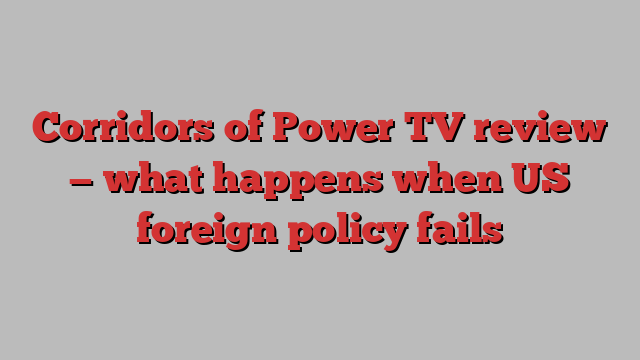
Unlock the US Election Countdown newsletter for free
The stories that matter on money and politics in the race for the White House
“Never again.” These two short words have been uttered numerous times by American presidents since the end of the second world war. The promise is that the self-avowed “global policeman” would never allow the horrors of the Holocaust to be replicated. Yet history has gone a different way. In Rwanda and Bosnia, Kurdistan and Darfur, genocides and mass atrocities unfolded while the US wrestled with the dilemma of how to react — if react at all.
Corridors of Power: Should America Police the World?, a sweeping eight-part series by the veteran filmmaker Dror Moreh, seeks to answer that question through a forensic interrogation of the country’s response to foreign crises from the end of the cold war to the mid-2010s. Narrated by Meryl Streep, it features the testimonies of dozens of leading political, diplomatic and military figures — including Colin Powell, Madeleine Albright and Samantha Power — who helped shape policies that determined the fates of millions of people.
Each episode focuses on one of the conflicts and provides a detailed account of how things played out both in Washington and on the ground. The historical, cultural and racial contexts that gave rise to each chilling case are also comprehensively outlined alongside graphic footage of the violence.
What emerges is a tragic sense of repetition as different yet comparable catastrophes are met with the same misjudgments and indecision. This, as national security adviser Jake Sullivan puts it, is the “loop of imperfection”, whereby “imperfect people, with imperfect information, facing imperfect choices” settle on solutions that “create new problems” to be tackled with the same “imperfect process”.
While recognising the difficulties of identifying the correct course of action, the documentary is also balanced and uncompromising in its analysis of what the US got wrong. There are moments, such as during Saddam Hussein’s ethnic-cleansing campaign targeting Iraq’s Kurdish minority in the 1980s, when America seemed numbed by self-interest. “Human rights and chemical weapons use aside, in many respects our political and economic interest run parallel with those of Iraq,” reads a state department memo that distils George HW Bush’s administration’s decision to delay imposing sanctions on a cold-war ally.
In later episodes about the Bosnian and Rwandan crises of the 1990s and the ongoing Syrian civil war, we are reminded how the west’s great superpower was paralysed by hesitancy. Presidents Clinton and Obama were both caught between ethical convictions and political concerns.
While some contributors stand by their administrations’ actions (or inaction), others openly concede to having made mistakes, or lament not being able to make their dissenting voice heard. For those who witnessed the bloodshed first-hand or lost colleagues, the sense of sorrow and regret is palpable.
Unsurprisingly, the series makes for challenging viewing; the dense political discussion and distressing footage are hard to digest without the kind of narrative flow found in, say, Adam Curtis’s documentaries. Still, we feel compelled to keep watching — to bear witness to what happens when America looks away, and to reflect on the lessons of history as the wars in Ukraine and Gaza continue to rage.
★★★★☆
On BBC4 from August 6 at 10pm. New episodes air weekly and available to stream on BBC iPlayer from August 6